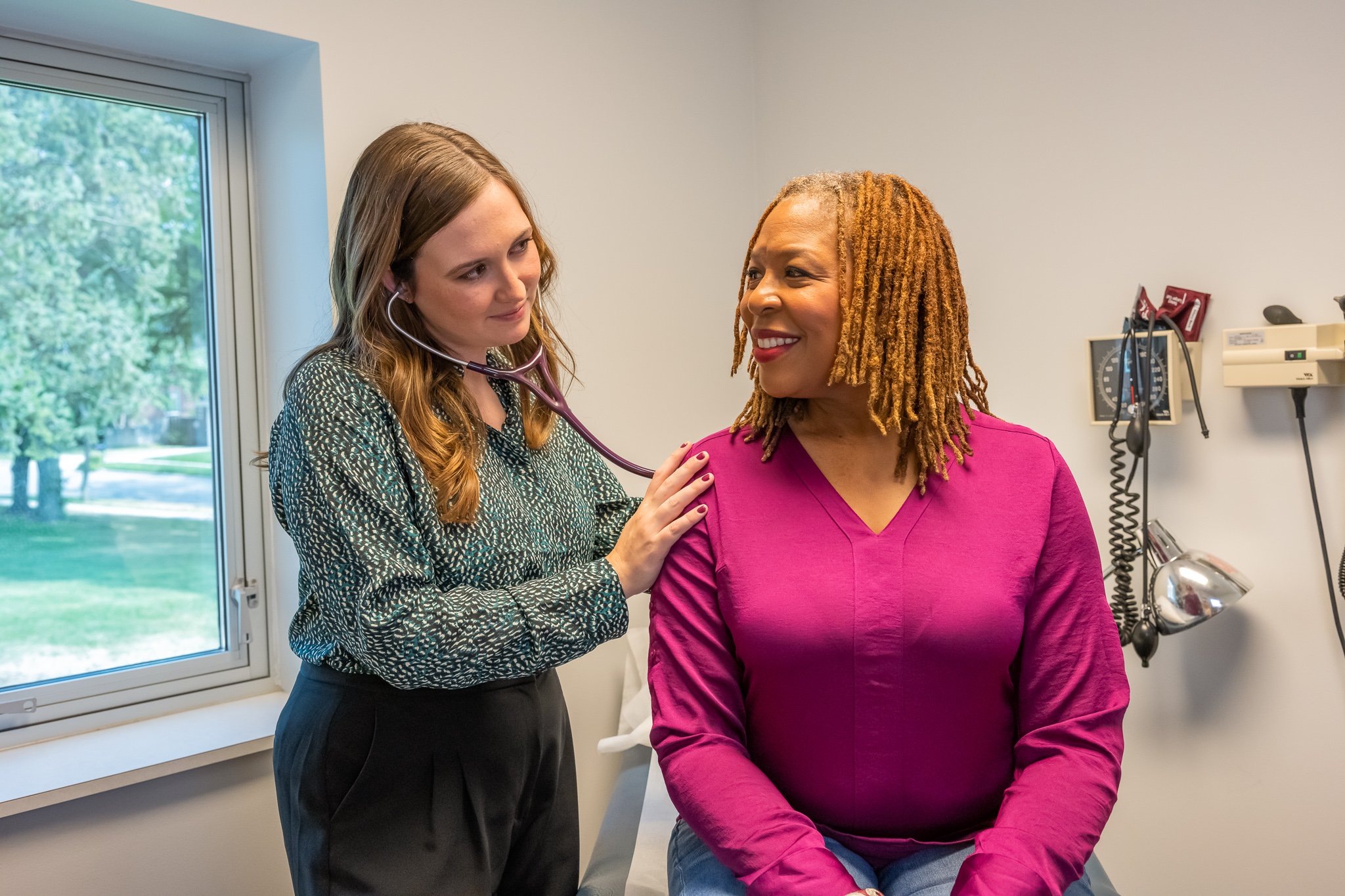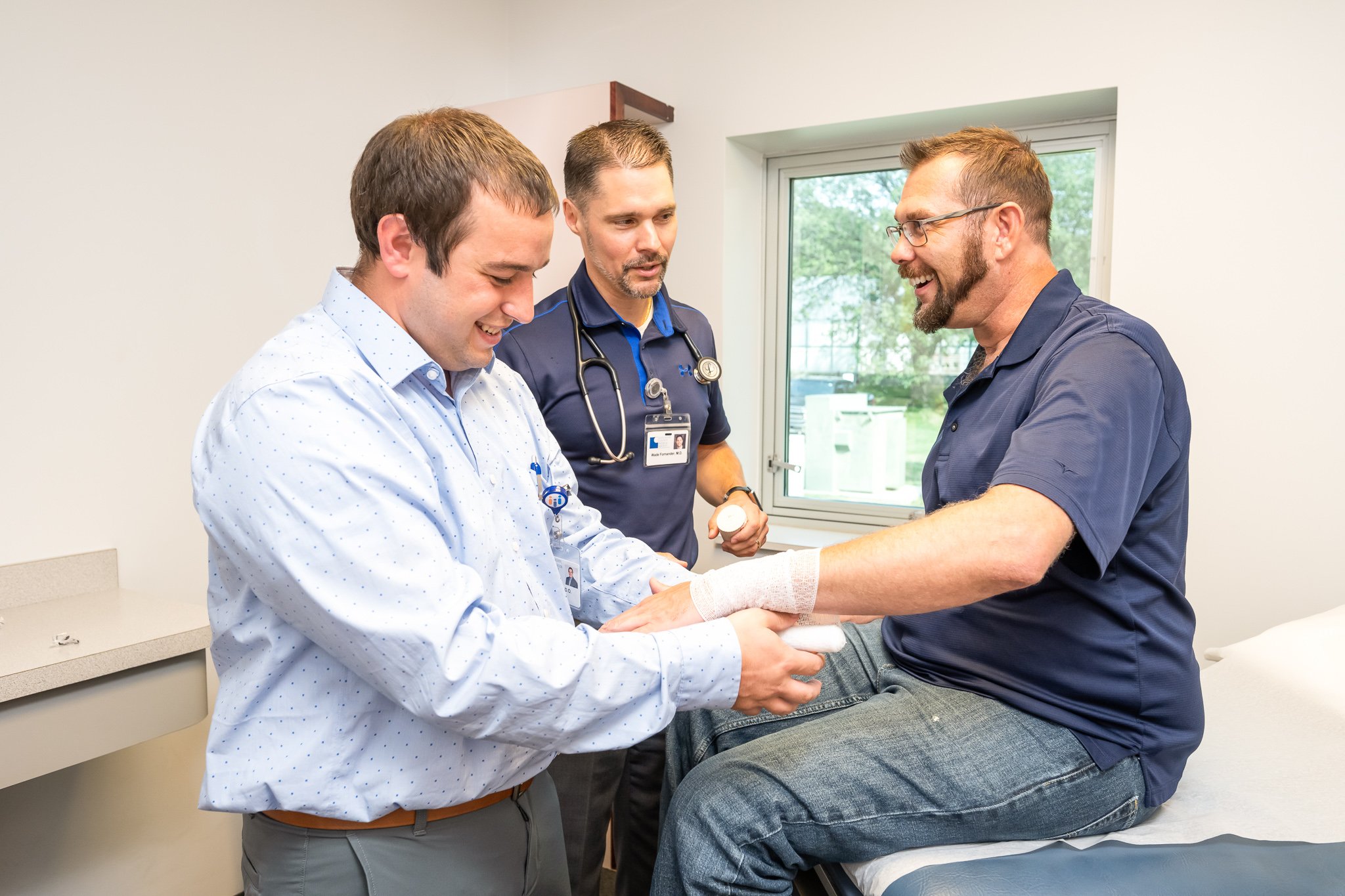
Curriculum
Our Patient Centered Medical Home offers a modern rural medicine model that assures residents are immersed in relevant training and ready for practice upon graduation. Didactic conferences, skill seminars, management of health systems, and a rural rotation are included in the core curriculum. Our relevant curriculum, authentic staff, and modern facilities create a strong sense of community and forward-looking healthcare.
Among one of the nation’s top residency programs, LFMP fuels high demands for primary care physicians in the Midwest.
With over 40 years merit in teaching, full accreditation from Accreditation Council for Graduate Medical Education (ACGME), we invest in physicians who will define care in our community. Nearly 350 community physicians volunteer more than 40,000 teaching hours to our residents each year.
Longitudinal instruction in behavioral medicine, geriatrics, and management of health systems is integrated into our three-year residency curriculum. First-year residents invest two half-days; second-year residents invest three half-days; while third-year residents spend four half-days per week training in the Lincoln Family Medicine Center.
Rotation Schedule
-
Orientation — 2 weeks
Chief Intern — 13 weeks
Community Medicine — 1 week
Emergency Medicine I — 4 weeks
ENT — 2 weeks
Hospital Medicine — 12 weeks
Obstetrics — 8 weeks
Office-based Internal Medicine — 4 weeks
Surgery — 2 weeks
Gynecology or Outpatient Pediatrics — 2 weeks
-
Cardiology — 8 weeks
Emergency Medicine II — 4 weeks
Neonatology — 4 weeks
Neurology — 4 weeks
Orthopedics — 6 weeks
Inpatient Pediatrics — 6 weeks
Outpatient Pediatrics — 2 weeks
Rural Rotation — 4 weeks
Gynecology - 2 weeks
Urgent Care - 2 weeks
Electives — 6 weeks
(8 weeks total of PGY2 must be designated as hospital-based medicine subspecialty services)
-
Rural Rotation — 4 weeks
Urgent Care — 2 weeks
Electives — 6 weeks
-
Ambulatory Care — 4 weeks
Athletic Medicine, Rheumatology, or Orthopedics — 2 weeks
Chief Resident — 7 weeks
Critical Care — 2 weeks
Dermatology — 2 weeks
Geriatrics — 4 weeks
Ophthalmology — 4 weeks
Psychiatry — 4 weeks
Trauma — 2 weeks
Urology — 2 weeks
Electives — 15 weeks
Electives Create Specialties
Required rotations may be repeated or extended for additional 1-4 weeks as elective time. Other electives may be arranged on an individual basis.
Allergy/Immunology
Anesthesiology
Behavioral Medicine
Burn Care
Chemical Dependency
Childhood Obesity
COVID Home Study
Cross-cultural Medicine
Dentistry and Oral Surgery
Emergency Medicine III
Endocrinology
Endoscopy
Home Study
Hospice
Lactation
Maternal Fetal Medicine
Neurosurgery
Obesity Medicine
Obstetrics II
Office Gynecology
Oncology/Hematology
Pain Management
Pathology
Pediatric Hospitalist
Plastic Surgery
Podiatry
Practice Audit
Radiation Oncology
Radiology
Rehabilitation Medicine
Research
Rheumatology
Trauma
Urgent Care
Wound Care
Hospital-based Medicine Electives
Cardiology III
Gastroenterology
Hospital Medicine II
Infectious Disease
Nephrology
Palliative Care
Pulmonary Medicine
Procedural Training
Each resident in the Lincoln Family Medicine Program is trained in:
Advanced Cardiac Life Support
Neonatal Resuscitation
Suturing Technique
Advanced Trauma Life Support
Casting Technique
Residents will have specific areas of interest; therefore, training in procedural skills will be flexible to best meet each individual’s needs and interests. Residents are routinely instructed in the following procedures by program residents.
Central Line Placement
Cervical LEEP
Cesarean Section
Colonoscopy
Cryotherapy
Endometrial Biopsy
Fine Needle Aspiration of Lesions
Forceps Delivery
Infant Intubation
Minor Surgery
Osteopathic Manipulation
Paracentesis
Thoracentesis
Umbilical Line Placement
Vasectomy
Chest Tube Placement
Colposcopy
Dilation & Curettage
Fiberoptic Nasopharyngoscopy
Flexible Sigmoidoscopy (60 cm.)
Infant Circumcision
Lumbar Puncture
Obstetric Ultrasound
Slit-Lamp Ophthalmoscopy
Treadmill and Pharmacologic Stress Testing
Vacuum Extraction
Vaginal Delivery
Some residents taking special initiative have learned EGD, breast biopsy, tympanostomy.
-
The Practice Management curriculum is designed to prepare our residents for the challenges of the business and human resource aspects of a medical practice. We begin the training in orientation. Residents learn about everything from billing and coding, to RVUs, to financial statements. This training prepares them with a comprehensive understanding of the non-patient care side of a medical practice, which is key to having a successful practice. Click to read more about our practice management curriculum.
-
Didactic conferences take place daily, in-person or virtually, at LMEP Family Medicine Center and are designed to cover the core curriculum of family medicine over a three-year period. Physicians, practice management consultants and allied health professionals are called upon to share their expertise. A Journal Didactic Club meets monthly. Community hospitals present numerous elective conferences that cover topics ranging from pediatrics to OB/GYN, internal medicine, surgery and many more subspecialties. If you are in the Lincoln area, please feel free to join us at any of our conferences.
Rural Rotations
The required rural rotation boasts four weeks in a charming Nebraska community. These sites change from year to year and are determined by the University of Nebraska Medical Center. During your second or third year, as a junior partner, you will practice in a family medicine group; this includes caring for hospitalized patients and emergency room care. Standard accommodations are provided for you and your family. We always encourage our residents to explore community activities and experience the lifestyle of the modern rural physician.
Clinical Research
Residents at Lincoln Family Medicine Program have the opportunity to be involved in clinical research through a partnership between Lincoln Medical Education Partnership and Velocity Clinical Research. Clinical trials provide a higher level of training and experience for our residents, giving them an environment where they can learn more about illnesses, protocols, and how to provide best practices should they have a patient who could benefit from participating in a clinical trial.






